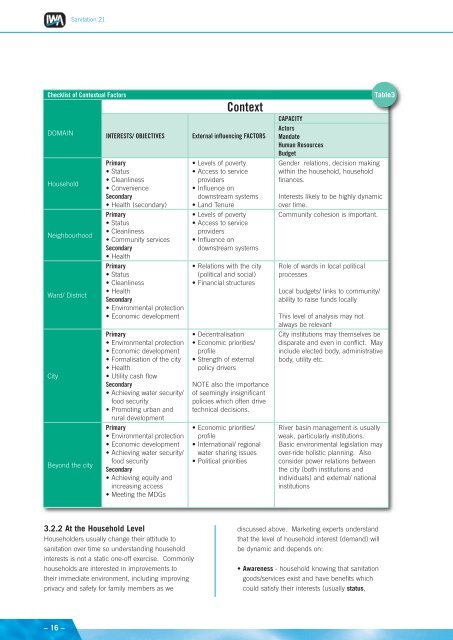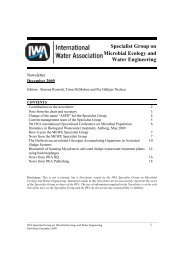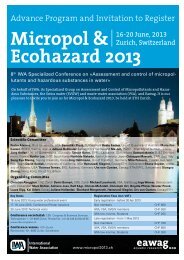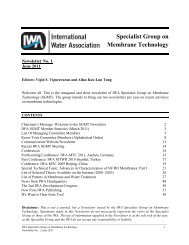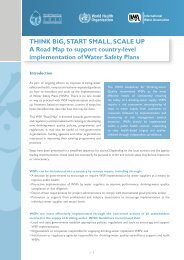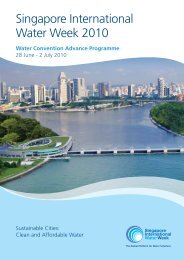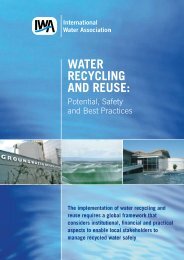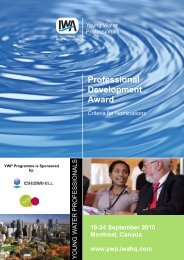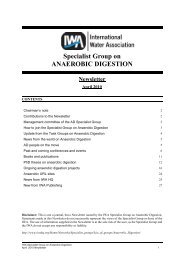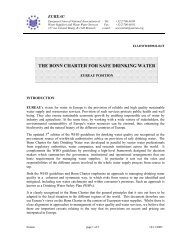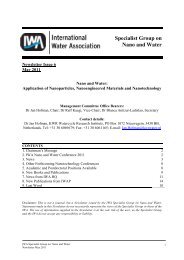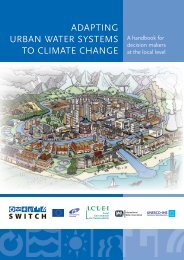Sanitation 21 planning framework - IWA
Sanitation 21 planning framework - IWA
Sanitation 21 planning framework - IWA
- No tags were found...
Create successful ePaper yourself
Turn your PDF publications into a flip-book with our unique Google optimized e-Paper software.
<strong>Sanitation</strong> <strong>21</strong>Checklist of Contextual FactorsDOMAINHouseholdNeighbourhoodWard/ DistrictCityBeyond the cityINTERESTS/ OBJECTIVESPrimary• Status• Cleanliness• ConvenienceSecondary• Health (secondary)Primary• Status• Cleanliness• Community servicesSecondary• HealthPrimary• Status• Cleanliness• HealthSecondary• Environmental protection• Economic developmentPrimary• Environmental protection• Economic development• Formalisation of the city• Health• Utility cash flowSecondary• Achieving water security/food security• Promoting urban andrural developmentPrimary• Environmental protection• Economic development• Achieving water security/food securitySecondary• Achieving equity andincreasing access• Meeting the MDGsContextExternal influencing FACTORS• Levels of poverty• Access to serviceproviders• Influence ondownstream systems• Land Tenure• Levels of poverty• Access to serviceproviders• Influence ondownstream systems• Relations with the city(political and social)• Financial structures• Decentralisation• Economic priorities/profile• Strength of externalpolicy driversNOTE also the importanceof seemingly insignificantpolicies which often drivetechnical decisions.• Economic priorities/profile• International/ regionalwater sharing issues• Political prioritiesCAPACITYActorsMandateHuman ResourcesBudgetGender relations, decision makingwithin the household, householdfinances.Interests likely to be highly dynamicover time.Community cohesion is important.Role of wards in local politicalprocessesLocal budgets/ links to community/ability to raise funds locallyThis level of analysis may notalways be relevantCity institutions may themselves bedisparate and even in conflict. Mayinclude elected body, administrativebody, utility etc.River basin management is usuallyweak, particularly institutions.Basic environmental legislation mayover-ride holistic <strong>planning</strong>. Alsoconsider power relations betweenthe city (both institutions andindividuals) and external/ nationalinstitutionsTable33.2.2 At the Household LevelHouseholders usually change their attitude tosanitation over time so understanding householdinterests is not a static one-off exercise. Commonlyhouseholds are interested in improvements totheir immediate environment, including improvingprivacy and safety for family members as wediscussed above. Marketing experts understandthat the level of household interest (demand) willbe dynamic and depends on:• Awareness - household knowing that sanitationgoods/services exist and have benefits whichcould satisfy their interests (usually status,– 16 –


